Transparency and Accountability: A Cincinnati Case Study
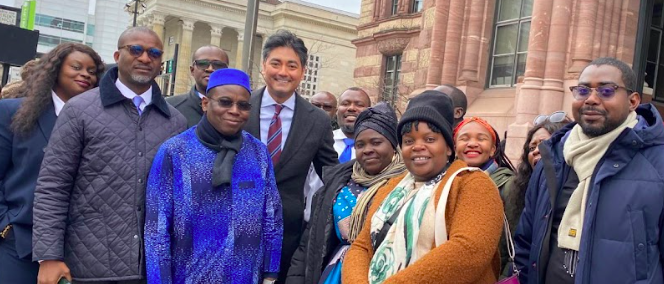
Government corruption is something that our community, sadly, is all too familiar with. As recently as October 2023, former Cincinnati City Council Member, Alexander “PG” Sittenfeld was sentenced by the U.S. District Court to 16 months in prison for bribery and attempted extortion by a government official. Although this was not the only case of corruption from former City Council members, this was the major case that visiting international delegates focused on during their recent visit to Cincinnati.
From January 31st to February 5th, 17 visitors from the countries of Benin, Cabo Verde, Cote d’Ivoire, Guinea, Haiti, Mali, the Republic of the Congo, Senegal, Sierra Leone, South Africa, Togo, Tunisia, and Zimbabwe visited many different local resources to speak about the issues the City of Cincinnati faced in the aftermath of the corruption scandal that rocked the city.
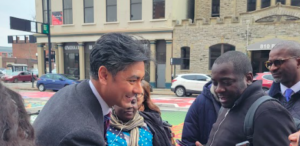
Mayor Aftab Pureval meeting International Delegates.
The following meetings covered the 2020 City Council Member corruption cases.
FBI Cincinnati Branch Office
The visitor’s first visit was to the FBI Cincinnati Branch Office. Visitors unanimously agreed that this meeting set the stage for the rest of their visit. Visitors loved speaking with the special agents who covered this case.
As you may know, in November 2020, the front-running in the mayoral race was was arrested for accepting $40,000 in bribes, becoming the third Cincinnati City Council Member to be arrested on federal corruption charges. He was finally convicted in July 2023 and sentenced just a few months later.
The agents that we met with discussed how they met undercover with P.G. Sittenfeld in which Sittenfeld accepted eight $5,000 checks in 2018 and 2019 from the undercover FBI agents who were pretending to be developers. Sittenfeld’s PAC records do not list the undercover agents as the source of the $40,000 total that he received directly from them, and his ethics disclosures failed to list expensive gifts and dinners he received from the undercover agents.
FBI agents also spoke about the case of Tamaya Dennard who pled guilty to honest services wire fraud for accepting $15,000 as part of a scheme to exchange her votes for money.
Visitors had the opportunity to not only speak to the agents, but view visual and audio evidence of P.G. Sittenfeld accepting the eight $5,000 checks from the undercover FBI agents. They also listened to audio evidence of Tamaya Dennard asking for money in exchange for her vote on City Council. This was incredibly valuable to the visitors in learning best practices in evidence collecting, compiling a case, and presenting it to the court in local government corruption cases.
Office of Ethics and Good Government
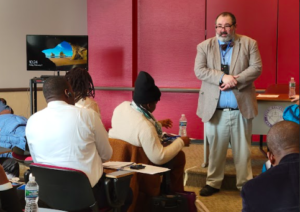
Mr. Liu speaking to International Delegates
With the Office of Ethics and Good Government, delegates were able to get a historical overview of corruption in Cincinnati. The issues we face today are not new. In the 1920’s, Cincinnati’s Mayor ran the city by proxy because he lived in New York. While we might think that’s crazy and could never happen today, it sets the tone for the corruption cases which we saw happen in 2020.
The Office of Ethics and Good Government created a process prohibiting developers from donating campaign money while their projects are pending with the City Council. This Temporary Prohibition List is also available to the public. Once a developer’s project has been voted on, then money can be donated. They also created a hotline where waste, fraud, or abuse can be reported either by an online form or on the phone. These are then submitted for an internal investigation and can be referred out to the Ohio Ethics Commission.
Mr. Liu explained to the international visitors that Cincinnati has a law that does not exist elsewhere— companies cannot donate money from their corporate accounts to council members. They have to do it from their personal accounts.
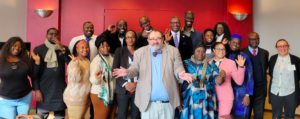
Mr. Liu from the Office of Ethics and Good Government with International Delegates
Visitors were interested to learn that there was a cap on donations at $1,100 to prevent one person from donating too much money. Candidates who received donations over that $1,100 amount had to refund the money. In the case of one candidate, they received as much as $9K more, and had to refund all of it. If he refused, he’d have to pay fine of $27K. For context, the average campaign is $100K.
It also interested the visitors to learn that every year in office elected officials have to fill out financial disclosures with their whole families’ properties and tax liabilities to determine their interests and family’s interests— to ensure people don’t do something to bolster their own businesses. Follow-up questions include tax returns for businesses, statement of company’s contracts to better understand what they are interests are. They are also required to catalogue every campaign contribution, every gift over $75, every trip they went on, additional info they need, and who paid for these things to ensure that the City Council Members are held responsible and recuse themselves in matters which they might not be impartial.
City Hall
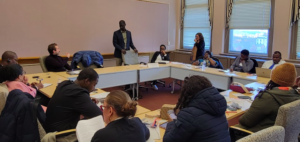
Delegates meeting with Council Member Mark Jeffrey’s Chief of Staff, Giovanni Rocco.
The last meeting the visitors had was with City Council Member Mark Jeffrey’s Chief of Staff, Giovanni Rocco. Giovanni Rocco gave a unique perspective in the 2020 corruption case. He had worked with both P.G. Sittenfeld and Tamaya Dennard.
During this meeting, he spoke about Dennard as a woman who struggled and humanized her to the visitors. She was more than just the corruption case.
The visitors truly liked getting to hear this case from someone who had personal connections– to understand how a City Council member could be driven to commit such egregious corruption. This gave them a better understanding of what underlying causes might be contributing to the misbehavior of City Council Members.
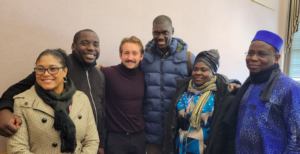
Visitors with Giovanni Rocco.
Conclusion
While Cincinnati has had problems with corruption in the past, there are many lessons to learn. The international visitors who came to Cincinnati last month were inspired by the work that our local offices do to prosecute corruption and prevent it from happening. They looked forward to bringing these practices back to their own countries to implement them.


